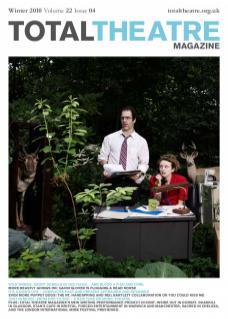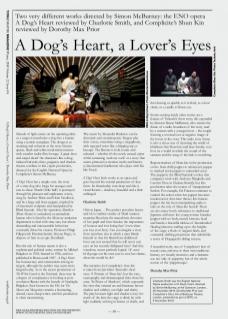Strands of light centre on the operating table as a surgeon transforms a dog into a human using a testicle transplant. The design is as stunning and coherent as the story bizarre: sparse, black-and-white modernism intercut with socialist realist film footage. A giant door and carpet dwarf the characters like a drug-induced fairytale; farce, puppetry and shadow theatre combine in this expert production, directed for the English National Opera by Complicite’s Simon McBurney.
A Dog’s Heart has a simple core: the story of a stray dog who longs for sausages and cats to chase. Sharik (‘little ball’) is portrayed through his pleasant and unpleasant voices, sung by Andrew Watts and Elena Vassilieva; and by a large and bony puppet, inspired by a Giacometti sculpture and manipulated by Blind Summit. After his operation, Sharikov (Peter Hoare) is unleashed, an animalistic human who is hired by the Moscow sanitation department to deal with stray cats, but whose demanding and unreasonable behaviour eventually drives his creator, Professor Filipp Filippovich Preobrazhensky (Steven Page), to dispose of him in an epic bloodbath.
But this tale of human nature is also a sophisticated political satire, written by Mikhail Bulgakov in 1925, banned in 1926, and not published in Russia until 1987. A Dog’s Heart has bureaucracy and communism among its targets, although the politics may seem more languid today. As in the recent production of The White Guard at the National, there may be a degree of complacency in looking at post-revolution Russia with the benefit of hindsight. Bulgakov (best known in the UK for The Master and Margarita) remains a fascinating, absurd, razor-sharp writer, and this production is often mesmerising.
The music by Alexander Raskatov can be dissonant and onomatopoeic. Singers play their voices, sometimes using a megaphone, with repeated notes like a dripping tap or hiccups. The libretto is both coarse and cultured – whether it’s the newly created enfant terrible screaming ‘suck my cock’ or a story that seems primeval (a creation myth) and literary (a disorientated intellectual who plays with fire like Faust).
A Dog’s Heart both works as an opera and goes beyond the normal parameters of that form. Its theatricality runs deep and this is visual theatre – shadowy, beautiful and a little unhinged.
Charlotte Smith
Only in Japan… The perfect porcelain beauty and oh so sadistic cruelty of blind samisen musician Shun-kin; the masochistic devotion of her pupil and lover Sasuke; the importance of honour and ‘not losing face’ (even when you lose your face). Can you imagine a story from anywhere else in which a man blinds himself so that his blind-from-childhood lover can rest assured that he will never cast eyes on her recently-disfigured face? And this, somehow, seems perfectly logical. Of course he’d gouge out his own eyes to save her shame, what else would he do?
The narrative for Complicite’s Shun Kin is taken from Jun’ichiro Tanizaki’s short story ‘A Portrait of Shun-kin’; but the tone, scenography and dramaturgical drive from his essay ‘In Praise of Shadows’, which expounds the view that oriental art and literature favour shadow and subtlety over light and clarity. The play between light and shadow is key: for much of the time the stage is dimly lit, with light suddenly arriving in beams or shafts, and then leaving as quickly as it arrived, as a door slams, or a candle is blown out.
Stories nesting inside other stories are a feature of Tanizaki’s short story, this expanded by director Simon McBurney, who creates the frame of a radio broadcast of the story, read by a woman with a younger lover – the couple forming a reversed-out or negative image of the lovers in the story. This radio story frame is also a clever way of denoting the world of blindness that Shun-kin (and later Sasuke, too) lives in: a world in which the sound of the samisen and the song of the lark is everything.
Representations of Shun-kin in the production evolve from child puppet to adolescent puppet to masked actor-puppet to unmasked actor. The puppetry (by Blind Summit) evokes that company’s work with Anthony Minghella and Carolyn Choa in Madama Butterfly, but this production takes the notion of ‘manipulation’ further. For example, Eri Fukatsu continues to control the action when her puppet becomes masked actor, then later throws this human puppet she has been manipulating aside to take on the role of Shun-kin herself. There are also many lovely references to traditional Japanese artforms: the young woman bunraku puppet with no body, merely kimono, head and hands; a beautiful tableau of disembodied floating kimonos wafting up to the heights of the stage; a flock of origami birds; and constantly shifting projections that unfold like a series of Dogugaeshi sliding screens.
A beautiful work, one of Complicite’s best of recent years, and true to their own traditions: literary, yet visually inventive; and a fantastic use not only of puppetry, but of the whole notion of the ‘puppetesque’.
Dorothy Max Prior
Charlotte Smith saw the English National Opera production of A Dog’s Heart, directed by Simon McBurney, at the Coliseum, London, 24 November 2010. Dorothy Max Prior saw Complicite’s Shun Kin at Barbican Theatre, London, presented as part of BITE, on 5 November 2010.

